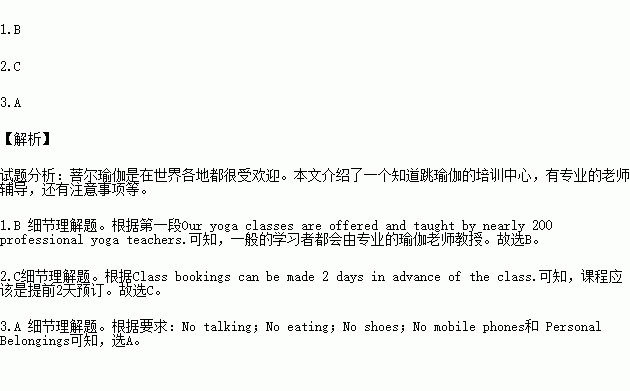题目内容
Pure Yoga(菩尔瑜伽)is devoted to serving the yoga community in Asia and beyond, offering a wide variety of classes such as Hatha Yoga, Hot Yoga, Yin Yoga Vinyasa, etc. Our yoga classes are offered and taught by nearly 200 professional yoga teachers. Private Yoga is also available for learners of all levels. Pure Yoga constantly invites world-known teachers to lead guest teacher workshops.
Class Booking
Class bookings can be made 2 days in advance of the class. It is important that you book your class in advance since some classes are more heavily attended than others.
We also limit our class sizes so that they are not overcrowded. If a class you wish to take is full, we will place you on the wait list and inform you of an opening as soon as possible.
To create the best experience for yourself and others, please follow these guidelines:
No talking
The yoga studio is a silent room. Please do not talk while in the studio and studio corridors
No eating
Do not eat in the studio.
No shoes
Remove your shoes before entering the practice rooms. Keep your shoes in your locker (寄存柜). Shoe lockers are also available for rental.
No mobile phones
Turn your mobile phones off or to vibrate (震动) mode. Do not take phones into the practice rooms.
Personal Belongings
Daily lockers are not for overnight use. Locks from any daily lockers that are kept overnight will be cut.
1.Who will teach general learners yoga?
A. A favorite yoga teacher.
B. A professional yoga teacher.
C. A world-known yoga teacher.
D. A private yoga teacher.
2.When should you book your class?
A. One month ahead of time.
B. Two months ahead of time.
C. Two days ahead of time.
D. One day ahead of time.
3.In the practicing room, you can__________.
A. keep your shoes in the locker
B. wear any shoes you like
C. eat some snacks if you are hungry
D. talk with your friends on the phone

